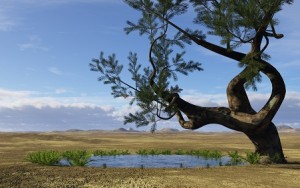On a tour of Jordan, as our bus made its way north from Petra to Amman, the guide kept touting the great lunch awaiting us in the capital with the words, “Many salads!” This puzzled us until we realized that, in a desert region, an abundance of leafy green vegetables, tomatoes, and cucumbers was a rare treat.
 As we traversed the Holy Land—through the Negev, the Judean wilderness, the Dead Sea region, and even the grassy districts of Jezreel and Sharon—we gained a greater appreciation of much of the Bible’s imagery. If God had settled the Israelites in the Arctic or the Amazon Basin, we would be reading more about the benefits of warmth and dryness, than of blessings particularly desired in an arid region:
As we traversed the Holy Land—through the Negev, the Judean wilderness, the Dead Sea region, and even the grassy districts of Jezreel and Sharon—we gained a greater appreciation of much of the Bible’s imagery. If God had settled the Israelites in the Arctic or the Amazon Basin, we would be reading more about the benefits of warmth and dryness, than of blessings particularly desired in an arid region:
Water and Vegetation: Psalm 1:3 speaks of those who are “like a tree planted by streams of water” and Revelation 7:17 promises “springs of living water.” Isaiah points to a day when
The wilderness and the dry land shall be glad;
the desert shall rejoice and blossom like the crocus . . .1
For waters break forth in the wilderness,
and streams in the desert;
the burning sand shall become a pool,
and the thirsty ground springs of water;
in the haunt of jackals, where they lie down,
the grass shall become reeds and rushes. (35:1, 6b-7)
Shade: In a sun-parched land, we are able to “abide in the shadow of the Almighty (Psalm 91:1); as if in “the shade of a great rock in a weary land (Isaiah 32:2); for
The Lord is your keeper;
the Lord is your shade on your right hand.
The sun shall not strike you by day,
nor the moon by night. (Psalm 121:5-6)
Of course, each of these features can typify something fearsome. Noah’s deadly flood was made of water, and the Psalmist seeks comfort in the Valley of the Shadow of Death. But the over-arching imagery is one of comfort and safety in the presence of water and shade.
Last week, I had lunch with an immigrant from the Middle East, a man who served as translator for our troops in the region. He and his wife have Muslim backgrounds, but they may be coming to faith in Christ. At any rate, they’ve turned to my wife and me and for help in crisis, now that they’ve gotten the frightening word that she has a malignancy and that surgery is imminent.
They’re well acquainted with literal desert, but now they find themselves in a desert of dismay, and I see little evidence that they’re finding water or shade for their souls in Allah or their circle of friends at the mosque. And so, over lunch last week, I took him to the Bible, where we read the “Be anxious in nothing” passage in Philippians 4:6, and I gave my testimony of how God does not always give us bread when we ask for it, but gives us bread or its equal—and not a stone (Matthew 7:7-11).
I gave him an inexpensive paperback version of the Bible and showed him it was okay to mark it up, as I had done with mine. We turned, then, to Psalm 23 where David spoke to those who had received Yahweh as God: “The Lord is my shepherd; I shall not want. He makes me lie down in green pastures. He leads me beside still waters.”
This poor couple is parched by circumstances, but it is our prayer that they will not only find the water of physical healing on earth, but also the living water of salvation for eternity.
—————————————
Endnote
1 Some argue, with good cause, that the modern state of Israel has benefited the actual land in her day, causing “the desert to bloom.”
//
//